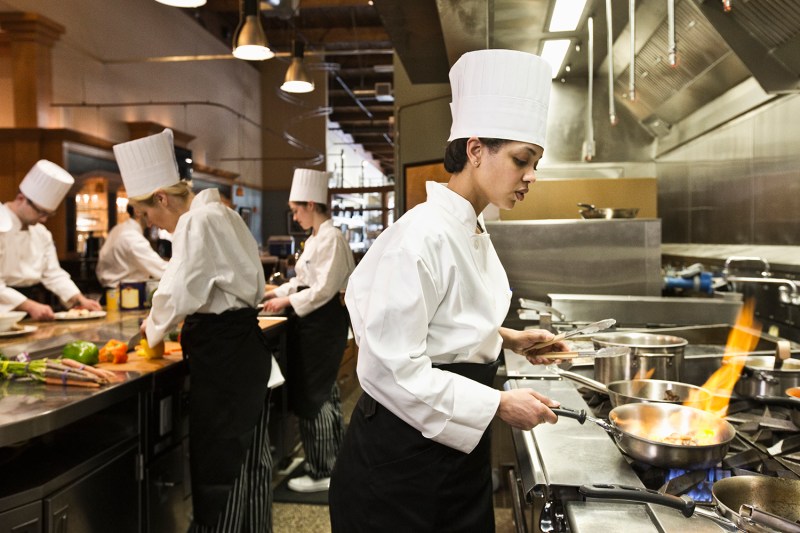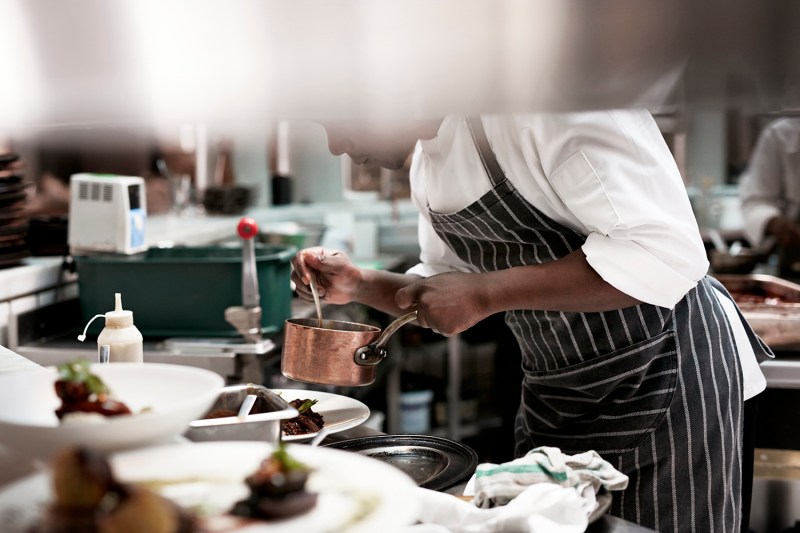
For generations, the formal training received by chefs who attended culinary school has centered around classic French technique, a series of preparations and skillsets popularized by Auguste Escoffier in the late 19th and early 20th centuries. Aspiring chefs learn how to master knife cuts like julienne, brunoise, and macedoine, how to whip up “mother sauces” like béchamel, hollandaise, and velouté, how to set up an organized mise en place, and how to execute cooking methods like flambéing, poaching, and sautéeing.
Traditional French training was once considered an essential cornerstone of any chef’s career progress, and kitchen hopefuls without this education often found themselves unable to ascend higher than a line cook position. However, the culinary scene in 2019 looks very different than it did in the eras of luminaries like Escoffier, Julia Child, and Jacques Pépin. Street-market stalls receive Michelin stars, food trucks have a reputation as the next frontier for inventive chefs eager to try something new, and casual all-day cafes are fast replacing upscale food temples as the hottest culinary destinations in major cities like New York, San Francisco, and Los Angeles. As the landscape shifts and diner preferences continue to skew in the direction of approachable, less-precious cuisine, is a classical French education still a crucial element to a successful kitchen career?
We spoke with a group of professional chefs — some French-educated, some self-taught — and compiled an array of opinions on this topic. Some champion the value of formal training, believing, as chef and co-owner Jayson Poe of Poe and Co. Catering in Santa Barbara, California does, that “to remove technique is to remove the walls of a house.” Others advise aspiring chefs to dive right into practical kitchen experiences and to gain their knowledge on the job. Read on to learn the benefits of classical training, along with the compelling arguments to the contrary.
Classic French training provides a strong and timeless basis, making it easier for talented chefs to riff and improvise.
As creative individuals, most pro chefs encourage experimentation in the kitchen, eagerly seeking out new recipes and techniques and ingredients to enhance their dishes and their guests’ experiences. In fact, classically trained chefs generally believe that their structured education provides them with the foundational building blocks necessary for effective improvisation.

“To me, the French were among the first to refine culinary technique and fine dining. I see the [knowledge of] French classics as truly fundamental to becoming a great chef and honing your craft — specifically [knowing how to make] the mother sauces of béchamel, hollandaise, espagnole, velouté, and tomate. I see these [recipes] as key [factors] to developing yourself as a chef — alongside an Escoffier cookbook. [This] doesn’t mean you have to always cook classic; at Tiny Lou’s, we apply classic technique but modernize it with our personal touch and Southern [influences],” explains executive chef Jeb Aldrich of Tiny Lou’s in Atlanta, Georgia.
Executive chef Patrice Martineau of the Harbor View Hotel in Edgartown, Martha’s Vineyard, Massachusetts, agrees, adding that “classic technique is the foundation of all cuisines in the world. In my opinion, it is the most important thing to learn and develop before trying to create anything else in the kitchen. Too many people jump into trying to craft unique dishes before learning the basics of cooking, only being able to make ‘fusion food’ with no real technique to speak of. For me, that fusion can just be confusion.”
“Classic technique is the foundation of all cuisines in the world. In my opinion, it is the most important thing to learn and develop before trying to create anything else in the kitchen.”
Chef-owner David Cáceres of La Panaderia in San Antonio, Texas values the skills imparted by his classic training and also credits this education for the freedom he now feels to venture and explore. “I received formal French training from Le Cordon Bleu and the SFBI (San Francisco Baking Institute) under Michael Zeus. I believe the French techniques we learned are strong bases, and they’re crucial for when you want to move on to your own styles and techniques. Nowadays, classic French techniques are [often considered] outdated; for the most part, people are more interested in new techniques, but it’s way easier to develop unique [methods] and keep up with the trends if you learn the classic styles first. For example, I created a ‘family’ of tequila croissants (tequila almond, tequila tres leches, and tequila apple croissants), but I never would have been able to make these unique pastries if it weren’t for my knowledge and understanding of the classic techniques,” Cáceres tells The Manual.
A shared education in French technique can make kitchen communication easier and more efficient.
Because a busy restaurant kitchen can quickly become chaotic, chefs frequently seek out ways to streamline communication. If the back-of-house team shares a vocabulary based on the teachings of a formal culinary education, that can simplify the process and ultimately save time. “The French technique provides a reference point for any chef to utilize. It’s a foundation that can be applied to any cuisine in producing a superior product, since that’s what French cuisine is all about: refining everything to the utmost. It can also cut out a lot of steps, [because] if you share the same training, you’re speaking the same language,” chef de cuisine Mark Ford of Anoosh Bistro in Louisville, Kentucky insists.

French training instills a sense of discipline and a respect for ingredients.
Above all else, traditional French training focuses on a reverence for expertly sourced ingredients, which goes hand-in-hand with a rigorous standard of discipline. “I believe that classical training is still a necessary asset for building a strong culinary foundation. At the age of 14, I began my training with nineteen-hour days at the two Michelin-starred Lei Mouscardins in St.-Tropez and the Michelin-starred Les Oliviers in Bandol, France. The training is a difficult and long process, but at the end of the day, I have that base which has helped me exponentially to develop a true understanding and respect for each ingredient I use,” executive chef Sébastien Giannini of Kingbird at the Watergate Hotel in Washington, D.C. tells us.
“The most valuable culinary training involves being thrown to the wolves and working long, hot shifts on a busy line.”
Executive chef Lucile Plaza of Le Coq Rico in New York City also believes that her long and arduous classical training gave her the necessary tools to thrive in the kitchen: “I was classically trained at Ecole Hôtelière de Paris — CFA Médéric at a young age, and [that experience] gave me the technical skills and knowledge to grow and learn as a chef. While I do think it is possible to succeed in this industry without formal training, it is very beneficial to attend a culinary school that offers [this style of education]. It sets young chefs up for success by providing them with the tools that they need, like precise knife skills, knowledge of basic sauce work, and proper cooking techniques. French training builds well-rounded chefs who have technical skills in both savory and pastry kitchens.”
A lot of valuable kitchen techniques can be learned on the job rather than in a classroom.
While the French methods taught in culinary school offer chefs a strong basis of knowledge, some culinary professionals believe that it’s more beneficial to learn necessary techniques on a first-hand basis. “The classic French techniques are still viable, from names of knife cuts to the mother sauces to the Brigade System. That said, this is textbook stuff; you can read up on the terminology online and practice knife cuts along with legendary chefs on YouTube. The most valuable culinary training involves being thrown to the wolves and working long, hot shifts on a busy line. No one cares how perfect your brunoise is when the job is to sling eggs, and you can’t flip ’em without using a spatula. Learn the basics, sure, but unless your sights are set exclusively on top-level fine dining, that knowledge is simply a foundation upon which to build real-world skills,” claims chef Ellie Golemb of Culinarie Kit in Nashville, Tennessee.
The bottom line: Chefs should seek out the training that makes the most sense for them.
It’s important to remember that a useful culinary education doesn’t follow a one-size-fits-all model. “My background includes a fairly traditional, European-based training. No matter the direction of the cuisine itself, the frame of reference is through the classic French mindset that has been most common in contemporary cooking. I have framed my skill set to rely on this focus in my interpretation of cuisine. [However,] I see the next generation [of culinary training] as a wave that’s blurring the lines between techniques, flavors, and inspiration. [Young chefs] are able to blend where techniques and flavors come from because of their access to so much more information. [Therefore,] the need for classic French background is dependent on the person; the access to information across the board [exists on a greater level] than it has before, which makes it possible to outgrow any foundation you have, so everybody doesn’t have to come from the same classic French training [to be successful],” says chef de cuisine Dirk Tolsma of EPIC Steak in San Francisco.



